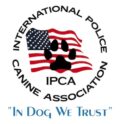2025 Currently Planned Classes
As of December 3, 2024
More Classes will be added when we have them.
To see class times see our Schedule page .
The Power of Instinctual Drives in K9 Nose Work®
The role and intermixing of instinctual drives within the parameters of detection training.
Tony will outline the relationship of inherited drives that promote involuntary actions which in return can increase reliable performance from the K9.
Will cover the breakdown of the three main drives of a K9 and their role in detection.
The role the three main inherited drives play in detection and their relationship in regards to learning and condition models.
How a dog being a dog – lessens/eliminates the handler influence through manipulation of instinctual drives
From Head to Toes: Select Topics Relating to the Care and Maintenance of the Performance Dog
This talk will cover topics that routinely come up in general practice pertinent to the health and maintenance of performance and working dogs, as well as issues that come up at training and trials, including
When to feed
How much to feed
Joint maintenance
The importance of fitness for Nosework
Maintaining fitness in the Senior dog
Managing Senior dogs at trials
How hot is too hot to work
How cold is too cold to work
A Judge’s Eye View
As a long time competitor, CNWI who coaches privately, teaches classes and holds many workshops, and a NACSW Trial Judge, I am excited to share with you some of my insights to help you become a better handler for your dog.
Do you ever wonder what the judge is thinking during your run?
Are you struggling to pass a level?
Did you fly through NW 1 and NW2 but can’t seem to get through a 3?
You’ve finally passed NW3 feeling like you’re an expert, only to begin Elite and feel you are starting all over again?
I hope to give you some suggestions to help you stop struggling and start truly having fun competing with your dog. We will cover the top 5 things I see that prevent you from doing your best as well as show you some really great things you do. A day with our dog should be the best day no matter the outcome of our competition. I may not be able to give you a first place ribbon but I can help you have “the best day.”
Odor Movement 101
This course covers the basic principles of fluid movement at different scales and the physical properties of air and odor that affect the process of odor-plume development. Additionally, it will discuss how dogs interact with a plume, the distribution of odors in various search environments, and the effects of common weather conditions on odor movement. Strategies for aiding detection dogs in difficult search environments will be discussed and developed.
Gamify your Nose Work : Applied Games for Canine & Handler Skill Development
Michael and Natalie will discuss the theory behind using games in nose work and showcase some of their favorite games. They will explain how to design your own games to effectively incentivize the learning you want to achieve, whether for yourself or your students.
Key Points:
- Understanding Games and Game Theory has huge benefits for nose work training
- Games enable people to learn faster than many other methods
- Games help people develop rhythm, balance, timing, and feel.
- Games allow us to mimic competition stress in a safe environment
- We are looking to optimize stress. It’s not as simple as just reducing it.
- As instructors (of others) and trainers (of our own dogs), we can use the incentive structures we build into games to get a variety of valuable results
- Group games vs solo games
Canine research assistants: Integrating perspectives from the lab and the field in applied olfaction
One of my passions is to work on bridging the gaps between the science and the practice, between the lab and the field, and between traditional methods in the world of dog olfaction and the olfactory research with other species. I will discuss a few concepts and issues that have emerged in the past few decades of my research with biomedical alert canines and wildlife conservation canines. I will cover two of three main areas of interest (depending on the interests of the attendees): The issue of motivation in working dogs (incentive learning and incentive motivation theories; this topic involves a significant role for classical conditioning), the role of psychophysical methods in olfaction research (in particular signal detection theory), and general considerations about the brain and “mind”-related constructs (cognition, emotion, motivation). I will discuss how my time in the field with my dogs directly informs my work in the lab.

